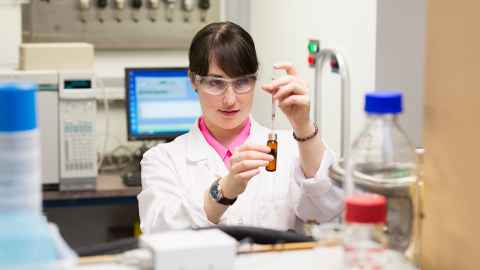Rebecca Deed raising the bar with wine
28 May 2019
Scientist Rebecca Deed will take the stage at Raising the Bar in August to talk about the chemistry involved in that glass of wine.

You want to come up with ways that will help winemakers and New Zealand wine.
Talking about wine. Tasting wine. It’s a tough job but someone has to do it. Dr Rebecca Deed, lecturer in the University of Auckland Wine Science programme, is that someone.
The 34-year-old shares her knowledge of viticulture and wine microbiology with students in the lab, at vineyards and even with her family.
As well, Rebecca has been a wine judge in a number of competitions and hopes to judge internationally one day when the time is right.
But it wasn’t that long ago that she didn’t drink wine or think she was much chop at chemistry.
“I was definitely more of an English and French-type student,” she says. “I just did a bit of biology at school.”
It was her mother who encouraged the former Green Bay High School student to think about wine science.
“I wasn’t confident in my chemistry so I stayed on with plant sciences for my honours. My PhD in wine yeast was mostly molecular biology, so I didn’t have to do much chemistry. Richard Gardner, my supervisor, was into wine yeast and that’s how I got into wine science.
“Now I’m 80 percent hired by chemistry and 20 percent biology, so have definitely gone the chemistry way. I like the interdisciplinary nature of it – and the fact that you can escape the lab.”
She spends time researching winemaking at the University-owned Goldie Estate vineyard on Waiheke Island and has also done some chardonnay testing in the lab for winemakers Michael Brajkovich and Kate Radburnd.
Rebecca works out through the chemistry how winemakers can achieve styles that are in demand.
“With chardonnay, it can be a ‘struck match’ or a flinty popcorn style, and sauvignon blanc you want to smell nice and tropical.
“You try to work out the chemistry behind making that style … so winemakers know why ‘if you do this, you will get more of these characters’.”
Rebecca analyses the sulphur compounds that occur during the winemaking process – which are either good or bad, depending on the grape and the micro-organisms present.
Rather than pick trends, though, wine science tends to follow them.
“For a long time, we mainly focused on sauvignon blanc for which we had the big government-funded project, and it’s only now that we’re starting to work on pinot noir, which has already been quite big for a long time.”
Funding long-term in-depth research can be a challenge. Funding decisions are made based on the number of plantings and the volume of exports. Sauvignon blanc is number one and pinot noir is number two.
“For both sauvignon and pinot it’s really about finding ways to improve the quality … to get better aromas and flavours … and for winemakers to do that more efficiently.”
Ideally, she’d like to explore more about wine “minerality”, the definition of which differs between experts.
“Some would say it’s like a flintiness or a wet stone, like if you were licking a wet rock – that quality. Other people say it’s a kind of neutrality and just acidity, like strong fruit characters. Others say it’s that flintiness that chardonnay has, for example. So it’s hard to get a grip on what it actually is. That’s why it’s interesting.”
Rebecca believes what she’s doing is important for the wine industry. “I think about that all the time. You want to help the industry. You want to come up with ways that will help winemakers and New Zealand wine.”
She also wants to have fun. One of the things she’s done is teach her family how to be “wine judges” at family wine-tasting sessions.
Another bit of fun will be when Rebecca takes part in Raising the Bar on 27 August (see information box below). She’s one of 20 academics and thought leaders giving talks in bars around the city.
Rebecca decided to be one of the speakers after attending a talk last year.
“I went to one with Rochelle Constantine talking about the Hauraki Gulf. Seeing Rochelle do it made me feel less nervous.
“She got up there and she said ‘You know I’m quite nervous,’ but she was fine.”
During her talk, Rebecca plans to explain why sulphur compounds in wine are important.
“I’ll talk about the good, the bad and the ugly. I can talk about all of those nice flavours that come from the compounds – such as the passionfruits in sauvignon blanc.
“But you’ll also find out about hydrogen sulphide and other nasties and how they can be good or bad depending on the wine style and grape variety. It’ll be interesting.”
And you can have a wine while you’re at it.
Raising the Bar
On Tuesday 27 August, ten Auckland bars will become a campus for one night. Leading academics and thought leaders will give talks, creating a relaxed environment for discussion.
Raising the Bar has been running worldwide for five years. This year’s event will feature 20 talks in ten bars over one night, with talks starting at 6.30pm and 8pm. Speakers include Olaf Diegel, Ethan Plaut, Deb Polson, Benedikt Fischer, Erin Griffey and Damon Salesa.
Last year, Raising the Bar Auckland was a sell-out (tickets are free) with almost 1,500 people pulling up a stool in a bar to hear the speakers all over the city.
The idea is to share the speakers’ unique learning experience with the public and make education part of the city’s popular culture. The website featuring all the speakers is at rtbevent.com/auckland